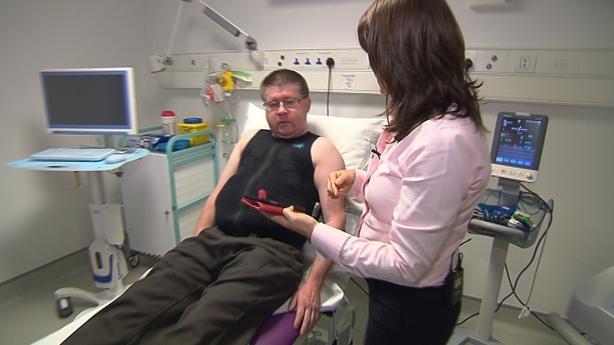Scientists at NUI Galway are conducting clinical trials with a new 'smart vest' to try to establish whether diabetes can have a damaging effect on the heart.
The sensor-packed garment can wirelessly and remotely monitor a patient's heart activity and other vital signs in real time over a prolonged period.
Smart vest trials examine effect diabetes has on heart pic.twitter.com/J6QotJzag1
— RTÉ News (@rtenews) November 23, 2017
The device, developed by Israeli company Healthwatch, is a sleeveless vest that has electrocardiograph sensors woven into the fabric.
It is also capable of recording a range of other variables, including the patient's respiratory rate, temperature and whether they are moving, sitting or lying down.
The data is collected in real time in a pack built into the vest and transferred wirelessly via a smartphone to a cloud based storage server.
Once there, doctors, researchers and the patient can view the information on either a laptop or smartphone.
"It allows the cardiologist to have a really in-depth look at their rhythms over a longer period - resting, at work, in activity to see where there might be triggers for arrythmias or cause for concern," said Maura Burke, Trials Manager at the HRB Clinical Research Facility in Galway.
"Traditionally, most people if they are being investigated for some sort of cardiac arrythmia or other issue, they either come into hospital and are admitted to a coronary care unit and wired up, or assesed in primary care with a 24-hour tape."
"This garment allows them to really go unnoticed. You can go about your daily business, go to work, you can play football, go for a run. Any of the patients that have been enrolled on the study thus far really have gone about their daily business."

The trial in Galway is specifically using the vest to explore the development of heart problems in patients with diabetes.
"We know they suffer from cardiovascular problems, heart problems," said Professor William Wijns, Research Professor in Interventional Cardiology in NUI Galway, who is leading the study.
"So we are trying to establish a link between glucose control, glucose excursion, either too high or too low or any abnormalities with the heart beat."
The trial, involving 100 people, will harness the power of big data to analyse the huge amount of information gathered for patterns or correlations.
Over the course of the week that each trial participant wears the vest, it is estimated that 151,000 measurements are recorded per patient.
The team is already thinking about other ways in which the vest could be used in the future for further research into cardiovascular disease.
"The availability now of these bio-sensors allows us to have a second look at what might be the trigger of acute events like stroke or heart attacks," said Professor Wijns.
"In the past this research has focused on populations. Now we have the opportunity to look into individual patients what might trigger a heart attack."

